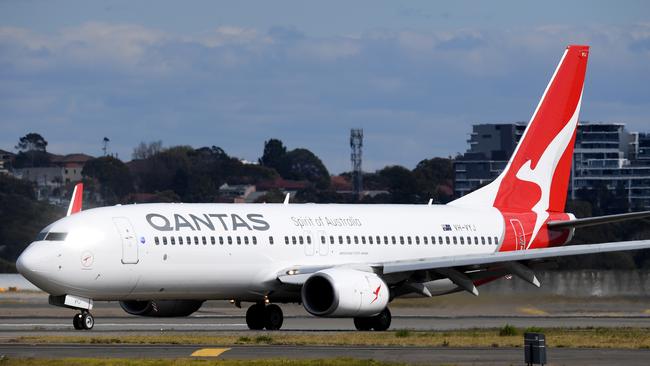Omicron’s $1.4bn hit to Qantas: Macquarie
Qantas’s move to stand up all employees in December will see the airline take a hit to earnings in the second half, says Macquarie.

The financial hit to Qantas from Covid-19 infections driven by the fast-spreading Omicron variant is set to top $1.4bn, equity analysts at Macquarie have told clients.
The impact could yet be higher with the airline, in a statement to the ASX on Friday, saying it would reduce domestic capacity by another 10 per cent between February and the end of March citing Western Australia’s backflip on its plans to re-open state borders.
The airline had previously lowered its group domestic capacity to 70 per cent in response to the latest Covid-19 outbreak and reduced demand for travel. Taking into account the extension to the WA border closure, Qantas now expected to operate at 60 per cent of pre-pandemic capacity throughout the March quarter.
In a note to clients, Macquarie researchers estimated that before the latest update, Qantas was already in line for a $1.4bn revenue hit – one which could also have considerable impact on the company’s balance sheet.
The analysts said the return to a “fully loaded domestic cost base” in December came just ahead of the sudden spread of Omicron, resulting in thousands of flight cancellations as passengers pulled out and crew called in sick.
Domestic aviation data for December compiled by the Bureau of Infrastructure, Transport and Regional Economics showed 2659 flights were axed in the month, including 1631 by Qantas and Jetstar.
Routes worst-affected by cancellations included Perth-Adelaide where 42 per cent of flights were cut, Darwin-Melbourne with a 25.6 per cent cancellation rate, and Darwin-Perth (25 per cent).
As a result, Macquarie analysts expect earnings before interest, tax, depreciation and amortisation were expected to come in 75 per cent lower than previously forecast at $247m, while the full-year before tax loss was estimated to be $1.84bn, up from $1.11bn.
“The delayed recovery will take a bite out of second half earnings, with the domestic cost base fully loaded in late 2021 to be ready to fly with the expected snap back in travel demand,” the investment bank’s note on Friday read.
In the 2021 financial year Qantas posted a $2.35bn before tax loss, following a $2.7bn loss the year before, blamed on more than $20bn in lost revenue due to the Covid crisis. Structural business improvements made by the airline would “eventually support higher profitability as travel demand recovers”, the note reads.
“While we are positive on Qantas, we point out the high operating leverage within the business and as such delays in easing travel restrictions across both domestic and international could derail the thesis … within domestic we also highlight that competition from Virgin and Rex can impact overall profitability, with irrational pricing and capacity. That said, we see this risk as low,” the analysts said.
Macquarie forecast the international recovery to gain momentum next year rather than in 2022, with capacity to return to 90 per cent of pre-pandemic levels by 2024. Beyond the challenges of the Covid-19 pandemic, Qantas was positioned for several significant court battles with unions in the year ahead. Next month, the Federal Court will hear the airline’s appeal against the decision that ruled the outsourcing of 2000 ground workers was unlawful.
And Qantas has asked the Fair Work Commission to terminate the current enterprise agreement for long-haul cabin crew in an effort to get them to agree to a new deal on the airline’s terms.
The move enraged unions and stunned flight attendants who now face significant cuts to pay and conditions if the claim is supported. Qantas shares closed 15c lower on Friday at $4.89.




To join the conversation, please log in. Don't have an account? Register
Join the conversation, you are commenting as Logout